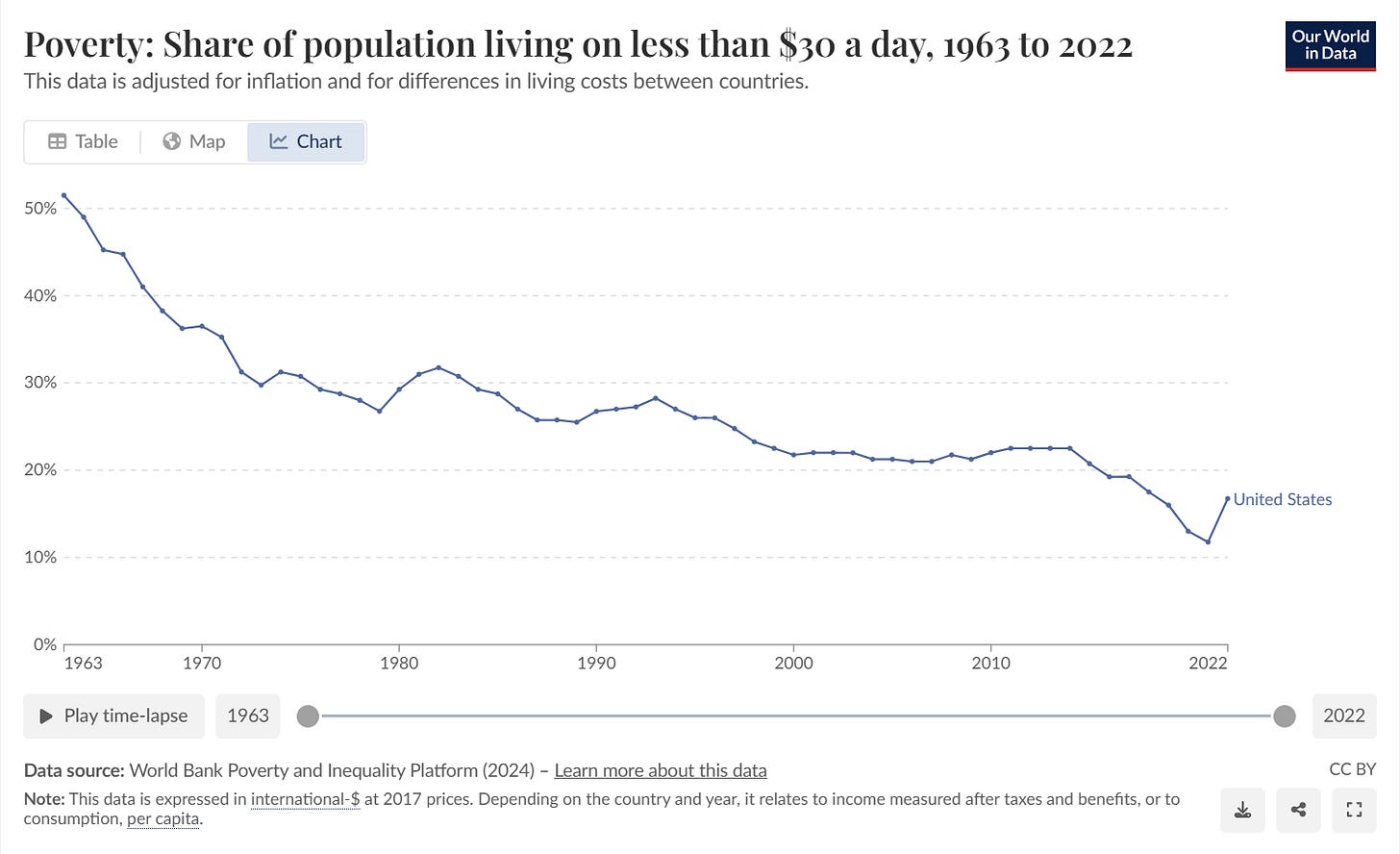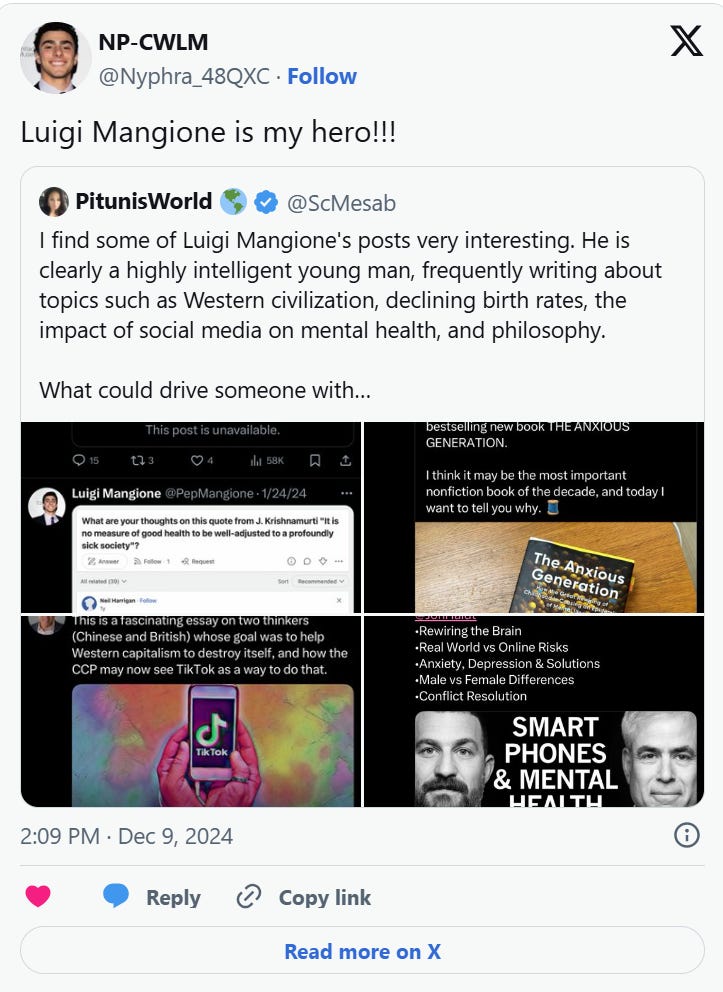The Tragic Inevitability of Luigi Mangione and Brian Thompson
A Shooting That Reveals Our Dangerous Divide—and How to Heal It
How does a man accused of cold-blooded murder become a symbol of resistance against a broken system? And what does it say about our society when such a tragedy sparks both outrage and a cult-like following? These questions have occupied my thoughts ever since Luigi Mangione allegedly shot Brian Thompson, the CEO of United Healthcare, on December 4, 2024. This essay is the first in a series examining the moral, social, and economic fault lines that have brought us to a grim crossroads of choosing between systemic collapse and radical change. It is an attempt to see how we can avoid an ever-escalating class war and find a better path forward together.
The murder’s fallout
Taking place against a background of widespread societal discontent, the shooting has captured society’s collective imagination—a bright Ivy League graduate driven to desperation by debilitating back pain and alleged repeated insurance denials, finally deciding to take matters into his own hands. In a brief manifesto found on his person at the time of his arrest, he said, “These parasites (greedy corporates) simply had it coming.”
The reaction was immediate and explosive. Social media was flooded with an outcry of support. People carried out rallies in the streets. Luigi was hailed as a saint, a martyr striking a blow against the establishment. Donations totaling 300,000 USD poured in for Luigi’s defense. In a recent survey by Cloud Research, 32% of Americans consider the murder to be at least somewhat justified. That is a shockingly high number. One in three people thought it was okay for a man to kill someone in cold blood. That number rises to 61% when one looks at the age group 18-29. It’s a clear indication that young people today overwhelmingly feel that the system isn’t working for them.
When I first heard the news, I felt an unsettling mix of resignation and empathy. We live in a world where healthcare denials and rising inequality dominate everyday headlines. So I wasn’t entirely shocked that someone had finally snapped. Part of me, like many people I spoke with during holiday gatherings, felt Luigi’s despair was understandable. Living in Toronto, one of the world’s costliest cities, I found myself sympathetic to narratives of the rich exploiting the poor. This situation has long resembled a powder keg, and I thought the shooting might just have lit the fuse. And, while I certainly did not condone murder, I found it hard to feel sympathy for Brian—a feeling that changed gradually as I engaged deeper with the complexity of the human tragedy involved.
And if we are to salvage anything from this tragedy, moving past our initial emotional reactions and engaging with this complexity might be the only way. It is imperative to dig deeper into the underlying societal issues that have led to this series of events.
Why Luigi has become a symbol of resistance
The widespread support for Luigi isn’t just about the broken US healthcare system. Luigi embodies the frustration of millions who have seen the economic ladder rapidly slipping out of reach. Common citizens have grappled with an astronomical 23% increase in cost of living since Covid. A recent survey suggested that as many as 70% of Americans are struggling to afford groceries. Rents have increased by an eye-watering 35% in the same period. At the same time, the wealth of the top 1% has soared. A recent Oxfam report shows that the top 1% own more wealth than the bottom 95% combined. This staggering inequality has led to a widespread “Eat the rich” and “Down with the system” narrative.
Given this backdrop of systemic failure, Brian Thompson, as a high-earning CEO, inevitably became a lightning rod for public anger. Protestors and social media commentators argue that Luigi’s act was a desperate stand against unchecked corporate power—a violent response to the systemic failure to protect the vulnerable.
However, this framing is quite lopsided and misses many important nuances.
The moral divide
Even as support for Luigi soared, many business leaders and friends of Brian Thompson put out statements condemning Luigi and the people supporting him. They were aghast that people who generally champion social equity and justice were suddenly condoning murder. They saw it as a double standard, a hypocrisy of the highest order.
Engaging with their arguments revealed that while Brian Thompson was undeniably privileged as a high-earning CEO—he also worked in an industry riddled with systemic flaws and navigated pressure from shareholders to maximize profits. Accounts from family and friends painted the picture of a kind and humble man who was present for all of his children’s events. Reading these accounts and realizing that he was a husband and a father of two gave me pause. Here was a human being stripped of all his humanity and cast singularly as a villain in this saga– with the world blind to the plight of his widow and now fatherless sons. A feeling of guilt washed over me as the very human stakes of this drama came into focus.
This moral tension is what makes this issue so challenging.
The division here goes deeper than judgments about the rightness or wrongness of Luigi’s act— it reflects fundamentally different worldviews. On one side, advocates for equity condemn CEOs earning 300X the average worker. They argue passionately for wealth redistribution measures like inheritance tax and progressive taxation. On the other side, defenders of capitalism baulk at a moral arbiter determining how much someone should earn. To them, inequality is the inevitable outcome of competition, innovation, and effort—a reflection of the natural order. This group sees attempts at redistribution as veiled communism, undermining individual freedoms in favor of forced equality.
For my part—seeing how systemic incentives made this situation inevitable and engaging with these conflicting narratives left me confused. I found it difficult to arrive at a values and first-principles based position on it.
Who is the hero? Who is the villain?
Who is right here? Is Luigi a hero who struck a blow against an unjust system? And Brian Thompson a villain who profited from the death and suffering of innocents? Or is Luigi the villain who robbed a man trying his best within a flawed system of his life and made his wife a widow and his children fatherless?
Attempting to answer these questions led me down a rabbit hole of complexity. Reviewing decades of economic data revealed a troubling paradox. In the US alone 40 million people have been lifted out of poverty since 1963. But at the same time, inequality has continued to grow to historical highs. Looking at these data points led me to ask— if poverty is declining, is anger toward elites justified, or is it envy exacerbated by Covid-induced economic hardship?


A little support goes a long way. If you find this post useful, please consider a small one-time contribution to keep this inquiry going
Does some people gaining more than others make the system unjust? How do you determine what is fair? 100X? 50X? 5X? Is someone who is only 5X richer than you good, but someone 50X evil? Where and how do you draw the line? And even if you could–where would we go from there? Isn’t some inequality necessary to incentivize people to work?
These questions are not easy, nor are they merely philosophical. Luigi’s actions and widespread support for them show us that they are deeply practical and urgent. As my research and thinking into the issue extended from days to weeks to months, understanding came bit by painful bit. The result is the series of essays you are reading.
In this essay series, I’ll argue that fixating on moral judgments around Luigi and Brian distracts from the necessary work of systemic reform. Instead, I’ll explore frameworks—like John Rawls’s veil of ignorance—that can help us build a more just society. We’ll examine data from housing, healthcare, and education to understand whether grievances about injustice are justified. We’ll also explore how adopting a first-principles-based value system can align incentives across social divides, leading to meaningful, sustainable change.
In the essays that follow, I argue that both Luigi’s supporters and detractors are partially mistaken. Celebrating murder, or vilifying those who sympathize with Luigi, is dangerously reductive and deepens societal fractures. Luigi Mangione’s act highlights a disturbing reality: when the system meant to protect people fails so spectacularly, tragedies become inevitable. But outrage alone won’t save us. We must acknowledge our interconnected humanity and commit to systemic solutions that ensure no one faces Luigi’s desperate choice again. If you too find yourself stymied by these issues, I invite you to read along and see how we might yet salvage this situation.
The tragedy of Luigi Mangione and Brian Thompson starkly illuminates our society’s fork in the road—on one side lies escalating division, violence, and systemic collapse; on the other, the challenging but necessary path of radical transformation. Real human lives are hanging in the balance. It’s not about choosing sides between Luigi and Brian—it’s about deciding the world we want to build for us and the next generation. The moment for decisive action is now.
Alternatively, if you find this post useful, please consider a small one-time contribution to keep this inquiry going. A little support goes a long way






I love how your piece refocuses the conversation on the problem that underlies the tension we see on this topic: the real culprit is not a CEO, a stratum of society, or a disgruntled young man, but the misaligned incentive structure in our political system.
I express something similar in the post I linked below, but yours is a notch (or several) above mine because you’re not being inflammatory, but pragmatic. In hindsight, my post just stokes the tension and served as a personal catharsis for me because I was so strident. Thanks for putting something so thoughtful out there.
https://open.substack.com/pub/gregscaduto/p/an-open-letter-to-the-faculty-lounge?utm_source=app-post-stats-page&r=41atmx&utm_medium=ios
Fantastic points.